| Pages:
1
2
3
4
..
6 |
careysub
International Hazard
    
Posts: 1339
Registered: 4-8-2014
Location: Coastal Sage Scrub Biome
Member Is Offline
Mood: Lowest quantum state
|
|
Quote: Originally posted by Praxichys  | ...
Another good point was brought up in the thread regarding the cost of potassium carbonate. It could be made in-situ with super cheap sodium carbonate
and KCl.... |
Does this really work? Sodium and potassium chlorides are about equally soluble in water, and so are sodium and potassium carbonates, so you will not
be able to separate the mixture of ions.
The mix might work for salting out the ethanol though, has it been tried? The linked thread raised the possibility but no references or results were
posted.
I can get pure sodium bicarbonate (to be dehydrated in the oven) and potassium chloride both for 50 cents a pound, these are by far the cheapest
reagents I have access to (other than water).
I had been debating the best way to get cheap reagent ethanol: starting with cheap vodka, or with Kleenstrip denatured alcohol (roughly half and half
methanol and ethanol with ~1% MIBK). The Kleenstrip is the cheapest solvent available to me, other than gasoline.
Not sure which would give the cleanest product - if you leave enough tails the MIBK contamination might no be too bad. How bad is the contamination of
miscellaneous fermentation products in vodka?
[Edited on 9-3-2015 by careysub]
|
|
|
Zombie
Forum Hillbilly
    
Posts: 1700
Registered: 13-1-2015
Location: Florida PanHandle
Member Is Offline
Mood: I just don't know...
|
|
That all depends on the brand.
Cheap store bought liquor is mainly what distillers call "Heads". It's the acetone, and Lighter Ketones.
They are lighter, and can be distilled out with careful Vapor Temp. control.
You're best bet for "store bought is EverClear... 190 proof or 95%ABV
http://en.wikipedia.org/wiki/Everclear_%28alcohol%29
They tried to have me "put to sleep" so I came back to return the favor.
Zom.
|
|
|
BromicAcid
International Hazard
    
Posts: 3227
Registered: 13-7-2003
Location: Wisconsin
Member Is Offline
Mood: Rock n' Roll
|
|
Quote: Originally posted by Zombie  | | To pre separate EtOH from water it is easier to freeze the water , an pour off the EtOH. Due to the volatility you really don't want to begin with
more that a 40% ABV in a "still".[Edited on 3-8-2015 by Zombie] |
http://www.engineeringtoolbox.com/ethanol-water-d_989.html
Unless you're starting from beer or wine you're not going to get much more concentrated by fractional freezing. By the time you get up to 35% EtOH
you're pushing the limits of a household freezer. There are plenty of ways to separate the water from EtOH, each with their own merits depending on
what equipment and reagents you have handy. This salting out is somewhat interesting but it is only another tool in the tool box.
|
|
|
careysub
International Hazard
    
Posts: 1339
Registered: 4-8-2014
Location: Coastal Sage Scrub Biome
Member Is Offline
Mood: Lowest quantum state
|
|
Quote: Originally posted by Zombie  | That all depends on the brand.
Cheap store bought liquor is mainly what distillers call "Heads". It's the acetone, and Lighter Ketones. |
I was hoping that by buying the absolute cheapest vodka (per mL ethanol) at BevMo I would score some that legendary Archer Daniels Midland vodka, the
stuff made from industrial 95% ethanol that is bought by the barrel and simply diluted with water.
Vodka drinkers no doubt recoil in horror, but the industrial ethanol is exactly want I want.
My other option was to go with 75% Everclear, which is the highest proof available in California. Per mL it is about twice as expensive. For that I
was going to try salting and then mol sieves.
I wondered about this state ban on 190 proof Everclear (maybe this is just corn-fed industrial ADM hooch, undiluted)? You're okay with 150 proof, but
190 is just too much? Really?
But then I thought that maybe it is a fire safety things. Liquor stores catching on fire is not exactly unknown. Storing a highly flammable solvent in
plastic bottles, treating it like a food item in the supply chain, does have its problems.
|
|
|
Zombie
Forum Hillbilly
    
Posts: 1700
Registered: 13-1-2015
Location: Florida PanHandle
Member Is Offline
Mood: I just don't know...
|
|
Quote: Originally posted by BromicAcid  | Quote: Originally posted by Zombie  | | To pre separate EtOH from water it is easier to freeze the water , an pour off the EtOH. Due to the volatility you really don't want to begin with
more that a 40% ABV in a "still".[Edited on 3-8-2015 by Zombie] |
http://www.engineeringtoolbox.com/ethanol-water-d_989.html
Unless you're starting from beer or wine you're not going to get much more concentrated by fractional freezing. By the time you get up to 35% EtOH
you're pushing the limits of a household freezer. There are plenty of ways to separate the water from EtOH, each with their own merits depending on
what equipment and reagents you have handy. This salting out is somewhat interesting but it is only another tool in the tool box.
|
This is about the most sensible post in the thread. (mine included)
Depending on your starting point, and where you need to end up... There are different routes. 
They tried to have me "put to sleep" so I came back to return the favor.
Zom.
|
|
|
Zombie
Forum Hillbilly
    
Posts: 1700
Registered: 13-1-2015
Location: Florida PanHandle
Member Is Offline
Mood: I just don't know...
|
|
Quote: Originally posted by careysub  | Quote: Originally posted by Zombie  | That all depends on the brand.
Cheap store bought liquor is mainly what distillers call "Heads". It's the acetone, and Lighter Ketones. |
I was hoping that by buying the absolute cheapest vodka (per mL ethanol) at BevMo I would score some that legendary Archer Daniels Midland vodka, the
stuff made from industrial 95% ethanol that is bought by the barrel and simply diluted with water.
Vodka drinkers no doubt recoil in horror, but the industrial ethanol is exactly want I want.
My other option was to go with 75% Everclear, which is the highest proof available in California. Per mL it is about twice as expensive. For that I
was going to try salting and then mol sieves.
I wondered about this state ban on 190 proof Everclear (maybe this is just corn-fed industrial ADM hooch, undiluted)? You're okay with 150 proof, but
190 is just too much? Really?
But then I thought that maybe it is a fire safety things. Liquor stores catching on fire is not exactly unknown. Storing a highly flammable solvent in
plastic bottles, treating it like a food item in the supply chain, does have its problems. |
The other thing you have to keep in mind is finished quantity.
Cheep hootch is five bucks per liter.
Everclear Azeotrope is 10 bucks
You're only recovering 35%ish from a liter of cheep stuff.
For experimental purposes I think the idea is fun. For anything really practical... Everclear, and 3A filtration is about the most cost effective way
to go. The pellets will out last your lab if you dry, and store them properly.
Just sayin'
[Edited on 3-9-2015 by Zombie]
They tried to have me "put to sleep" so I came back to return the favor.
Zom.
|
|
|
deltaH
Dangerous source of unreferenced speculation
    
Posts: 1663
Registered: 30-9-2013
Location: South Africa
Member Is Offline
Mood: Heavily protonated
|
|
Yes, 3A zeolite is a good way to dry azeotropic ethanol. What I'm looking for is the chemical 'treatment' for the step before that, that is to take
liquor up to something that you won't have to use a ton of zeolite on. I'm hoping that a salting out combined with a one stage distillation can help
here.
Then there's the question of what to do with mash to take it to liquor (beside distillation). As Molecular Manipulations stated,
salting out didn't work at such low concentrations.
Zombie has raised the option of freezing as another method of enriching, can this be done with mash... more importantly, does it work
well on mash?
What about solvent extraction and what about using cooking oil? At what stage of the enrichment train, if any, could 'solvex' be used? e.g. Could you
extract mash with cooking oil, then heat to drive off the vapours and condense strong liquor ready for salting out distillation?
There lots of room for experimentation here 
|
|
|
Zombie
Forum Hillbilly
    
Posts: 1700
Registered: 13-1-2015
Location: Florida PanHandle
Member Is Offline
Mood: I just don't know...
|
|
A single stage distillation can't hit Azeo unless you start w/ azeo.
I'm exaggerating but not by much. Freezing mash is one of the oldest ways of removing water.
The oil thing I have never heard or thought about.
Salting mash sounds impractical.
I do kinda like the idea of an in line drier. It's really a fuel ethanol kinda thing tho.
They tried to have me "put to sleep" so I came back to return the favor.
Zom.
|
|
|
clearly_not_atara
International Hazard
    
Posts: 2691
Registered: 3-11-2013
Member Is Offline
Mood: Big
|
|
| Quote: | Hypothesis:
Saturating drinking gin with anhydrous zinc chloride will increase the alcohol concentration of the vapours enough to make it flammable.
|
Hypothesis:
ZnCl2 + H2O >> HCl + "ZnClOH"
HCl + EtOH [cat ZnCl2] >> EtCl + H2O
I'm, um, slightly afraid that you might have cancer. Just be glad you didn't distill it! (SN2 is slow at RT)
[Edited on 9-3-2015 by clearly_not_atara]
|
|
|
deltaH
Dangerous source of unreferenced speculation
    
Posts: 1663
Registered: 30-9-2013
Location: South Africa
Member Is Offline
Mood: Heavily protonated
|
|
Solvent extraction is *just* another kind of phase separation technique, but it works best when there's favourable partitioning between the thing
you're trying to extract and the oil to that of it's aqueous phase. With ethanol, this is probably not that favourable, so probably a lousy idea.
My gut feeling still tells me that there might be something in using K3PO4 with intermediate concentration alcohol, I'll be experimenting with that.
Yes, this is more for fuel and solvent ethanol applications than drinking.
********************************************************
Just had a brainwave...
One might combine a solvent extraction with salting out, that is, saturate with Na2SO4, K2CO3 or K3PO4 and also use whatever oil you like for the
second phase (gasoline or a paraffin if you're going the fuel route)
From what Praxichys said earlier, one of the problems with salting out is that there's too much water in the organic phase that
forms, but if one used an oil there, then you might depress that strongly.
The salt makes ethanol not want to be in the aqueous phase while the oil makes water not want to be in the organic phase.

[Edited on 9-3-2015 by deltaH]
|
|
|
deltaH
Dangerous source of unreferenced speculation
    
Posts: 1663
Registered: 30-9-2013
Location: South Africa
Member Is Offline
Mood: Heavily protonated
|
|
Quote: Originally posted by clearly_not_atara  | | Quote: | Hypothesis:
Saturating drinking gin with anhydrous zinc chloride will increase the alcohol concentration of the vapours enough to make it flammable.
|
Hypothesis:
ZnCl2 + H2O >> HCl + "ZnClOH"
HCl + EtOH [cat ZnCl2] >> EtCl + H2O
I'm, um, slightly afraid that you might have cancer. Just be glad you didn't distill it! (SN2 is slow at RT)
[Edited on 9-3-2015 by clearly_not_atara] |
I'm not afraid at all of this occurring to any amount worth worrying about, but thanks for the concern.
As for the cancer and since I'm a caucasian in Africa, risk from sun exposure is 10^17 greater (yes I quickly worked that out... not) 
|
|
|
careysub
International Hazard
    
Posts: 1339
Registered: 4-8-2014
Location: Coastal Sage Scrub Biome
Member Is Offline
Mood: Lowest quantum state
|
|
Speaking of in-line driers, this discussion is not complete without mentioning to very good performance of warm, dry corn grits in a drying tube.
http://journeytoforever.org/biofuel_library/ethanol_grits.ht...
The grits must be heated to 80 - 110 C so that the process is direct absorption of water vapor by the polysaccharides in the grits, but it can produce
99.9% ethanol. The grits can be take quite a large water load before needing to be replaced/regenerated, and they can be dehydrated and reused
repeatedly (probably not worth the trouble for a lab scale process).
[Edited on 9-3-2015 by careysub]
|
|
|
Zombie
Forum Hillbilly
    
Posts: 1700
Registered: 13-1-2015
Location: Florida PanHandle
Member Is Offline
Mood: I just don't know...
|
|
A few distillers from the forums I frequent have tried corn as a drying agent. All withe similar results.
At or around 98 -99% ABV but all of them had the abv drop to Azeo within a few hours. 6 hours was the longest it held.
Now if you stored it in inert gas or a vacuum sealed container it will hold. This is a whole 'nuther topic tho...
I finally understood the point of the oil... Nice theory, I'd like to see what happens.
They tried to have me "put to sleep" so I came back to return the favor.
Zom.
|
|
|
deltaH
Dangerous source of unreferenced speculation
    
Posts: 1663
Registered: 30-9-2013
Location: South Africa
Member Is Offline
Mood: Heavily protonated
|
|
I am not kitted for distillation, but here's the experiment I'm thinking of:
Saturate cheap liquor with potassium carbonate. Extract with three equal volumes of cooking oil (e.g. sunflower) by shaking for a minute, then
allowing to separate. Combine oil extract portions into one and distill (the distillation is more of stripping the alcohol because clearly the oil
'ain't going nowhere'). Pour liquor tails with residual salt in a tray and leave out in the sun to dry to recover the salt.
It would be great if someone would be willing to try this and report on what's recovered.
|
|
|
papaya
National Hazard
   
Posts: 615
Registered: 4-4-2013
Member Is Offline
Mood: reactive
|
|
deltaH, I'm not sure vegetable oil is miscible with ethanol, are you sure it is?
|
|
|
deltaH
Dangerous source of unreferenced speculation
    
Posts: 1663
Registered: 30-9-2013
Location: South Africa
Member Is Offline
Mood: Heavily protonated
|
|
No I'm not  Perhaps wise to first try dissolving a little methylated spirits
into some vegetable oil to check. Thanks for pointing that out. Perhaps wise to first try dissolving a little methylated spirits
into some vegetable oil to check. Thanks for pointing that out.
Well at least we know gasoline would definitely work, but then that's only good for fuel applications. I wouldn't distill the gasoline of course, but
maybe dry it if necessary.
[Edited on 9-3-2015 by deltaH]
|
|
|
pneumatician
Hazard to Others
  
Posts: 409
Registered: 27-5-2013
Location: Magonia
Member Is Offline
Mood: ■■■■■■■■■■ INRI ■■■■■■■■■■ ** Igne Natura Renovatur Integra **
|
|
I read in POP-SCI a method to increase the alcohol concentration:
"HIDE GLUE for alcohol dryness" but I never make a try
here a lot of info:
https://archive.org/details/alcoholitsproduc00simmuoft
a tech is put benzene but this is, maybe, the reason of news here and there of explosions in alcohol factories, apart benzene is cancer stimulator so
for human use is no-no.
|
|
|
aga
Forum Drunkard
    
Posts: 7030
Registered: 25-3-2014
Member Is Offline
|
|
deltaH was off on one again while we were discussing this Ethanol separation method on skype.
The notion is that tripotassium phosphate is sufficiently hygroscopic and ethanol-hating that it can rip ALL of the water from the EtOH/Water
azeotrope.
Sounded like bollocks to me, however there's One way to find out ...
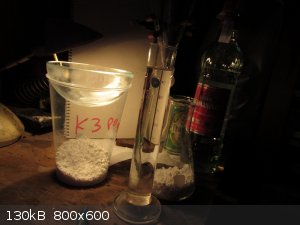
K3PO4 was prepared by reacting 3 mol equivalents of KOH with phosphoric acid.
This is a bitch to get to crystallise and dry, however determined boiling and a couple of hours in an oven @ 130 C worked to yield dry white powder
(the hydrated crystal lumps are rock hard, a bit like Al Sulph).
An EtOH refractometer was calibrated with distilled water (DW), then some OTC Vodka was tested to be 37w% EtOH.
The solubility in water of K3PO4 calculates to require ~57g to completely saturate the water in 100ml of this Vodka.
60g of dry tripotassium phosphate was loaded into a 250ml conical flask and 100ml of the Vodka was added, with a stirbar running for 4 minutes.
With stirring switched off, this mixture quickly formed 2 layers - within about 15 seconds.
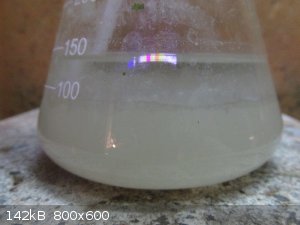
This bi-phasic mixture was put into a 250ml separatory funnel, then quickly dumped back into the conical flask - the undissolved crystals would have
blocked the tiny exit hole.
An attempt was made to filter with a standard filter paper, however the rate of flow was stupidly low, and the two phases were seen in the funnel.
Filtering into the sep funnel with a coffee filter was successful.
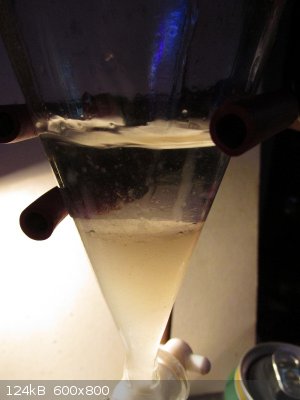
On deltaH's suggestion, some of the crude mixture was placed in a test tube and two drops of phenolpthalein were added.
... the idea being that the indicator would remain in the upper organic ethanol layer.
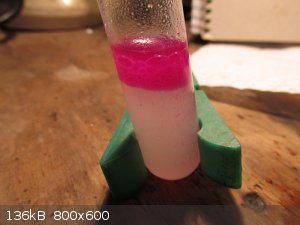
Seems he was right about that.
2ml of the Upper layer in the sep funnel were drawn off with a pipette and tested with the refractometer.
The reading said 100w%.
The refractometer was cleaned and re-calibrated with DW (no adjustment was necessary) and the upper layer re-tested.
100 w%
Impossible result, so a volume was drawn off in a 10ml graduated pipette and precisely 3.1ml was mixed with 3.1ml of DW.
This mixture was mixed thoroughly and tested with the refractometer.
50%. Not 49 or 51 or anywhere between. Exactly 50%.
The refractometer was again cleaned and recalibrated.
Again, no adjustment was necessary.
The original Vodka was re-tested, giving a reading of 37%.
Congratulations deltaH, you've done it again !
Crude Ethanol concentration to 100% with no distillation
Got to be a World First.
(please direct all chemistry questions to deltaH as i'm just the spanner-monkey in this experiment)
[Edited on 11-11-2015 by aga]
|
|
|
aga
Forum Drunkard
    
Posts: 7030
Registered: 25-3-2014
Member Is Offline
|
|
Outakes
Naturally nothing ever goes 100% according to plan.
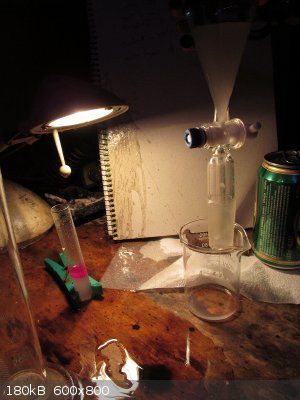
A 140mm 24/40 ground glass-jointed funnel was used for the filtering.
I assumed the Seal of the ground glass joints was preventing the first filtration attempt, so raised the funnel using a clothes peg.
When operating the sep funnel valve the entire thing fell off, spilling about half of the product all over the desk area.
|
|
|
deltaH
Dangerous source of unreferenced speculation
    
Posts: 1663
Registered: 30-9-2013
Location: South Africa
Member Is Offline
Mood: Heavily protonated
|
|
WARNING: For those of you who might use it for demonstration, please warn kids that drinking 100% ethanol WILL kill
you! Absolute alcohol is solely for technical use, NOT consumption.
STUNNING WORK once again aga! I'm extremely grateful that you volunteered your time on this and thank you!
I must say, I am shocked at the 100% result!
I expected K3PO4 to work better than the other salts used because the anion has a higher charge for a similar size and so a higher charge density than
SO4(2-) and CO3(2-), but I would NEVER have expected 100%, something close to azeotrope at best.
Remember that second liquid phase is still in equilibrium with an aqueous phase, so the fact that this is so far skewed as to be 100% is incredible to
me as a chemical engineer.
I could have expected this if the solid formed a solid hydrate and so sank most of the water, but not in a million years from an aqueous LIQUID layer
in equilibrium. ABSOLUTELY MIND BLOWING!
Seems there was no need for using oil in the second layer to get 100%, still can't believe it WOW WOW WOW!
QUESTIONS:
(1) Is it really necessary to filter? Can't you just let it stand covered for some time and then carefully decant off the alcohol layer?
(2) How well does this work with the equivalent of an alcoholic mash? i.e. ~10% v/v ethanol? On second thought probably not necessary as perhaps it's
still a good idea to distill a mash at least once just to clean it up and work with more manageable amounts of K3PO4 and also make it easy to recycle
the K3PO4 from a clean solution afterwards.
Well done and thanks once again!
P.S. Glass blowers, we still love you 
[Edited on 12-11-2015 by deltaH]
|
|
|
JJay
International Hazard
    
Posts: 3440
Registered: 15-10-2015
Member Is Offline
|
|
I'm impressed.
|
|
|
aga
Forum Drunkard
    
Posts: 7030
Registered: 25-3-2014
Member Is Offline
|
|
| Quote: | QUESTIONS:
(1) Is it really necessary to filter? |
No, not really, just that i was excited and got impatient (hence the spill).
I'll try a smaller amount of beer with a drop of phenolpthalein.
Can anyone out there please repeat the experiment to verify that we're not dreaming ?
[Edited on 12-11-2015 by aga]
|
|
|
aga
Forum Drunkard
    
Posts: 7030
Registered: 25-3-2014
Member Is Offline
|
|
A few moments ago 43g of dry K3PO4 was added to 50ml of 4.5% beer.
The resulting mixture resembles more of a Gel than a liquid.
A few small clear droplets were occasionally observed on the top of the mixture, however the turbulence caused by the CO2 'fizz' made
observation very difficult.
Likely that this process would not be useful for low EtOH 'mash' concentrations.
|
|
|
JJay
International Hazard
    
Posts: 3440
Registered: 15-10-2015
Member Is Offline
|
|
I'd be interested in giving it a try, but I don't have any TPP... is it available OTC?
|
|
|
aga
Forum Drunkard
    
Posts: 7030
Registered: 25-3-2014
Member Is Offline
|
|
Phosphoric acid is available (here) from farming suppliers.
|
|
|
| Pages:
1
2
3
4
..
6 |